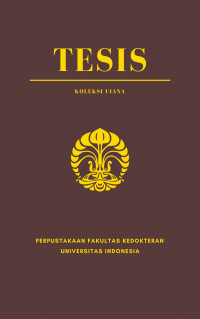Tesis
Keberhasilan Pengobatan Tuberkulosis Terpandu Uji Provokasi Obat pada Pasien dengan Riwayat Hipersensitivitas Obat Anti Tuberkulosis = Success rate of Drug Provocation Test-Guided Tuberculosis Treatment in Patients with History of Anti-Tuberculosis Drug Hypersensitivity.
Latar Belakang: Hipersensitivitas obat anti tuberkulosis (OAT) dapat mempengaruhi pilihan pengobatan pasien selanjutnya dan mempengaruhi keberhasilan pengobatan tuberkulosis (TB). Uji provokasi obat diharapkan dapat memandu pengobatan TB pada pasien dengan riwayat hipersensitivitas OAT. Tujuan: Penelitian dilakukan untuk mengetahui proporsi hipersensitivitas masingmasing OAT lini pertama melalui uji provokasi obat, mengetahui karakteristik pasien yang mengalami hipersensitivitas OAT lini pertama, dan mengetahui keberhasilan pengobatan TB terpandu uji provokasi obat pada pasien dengan riwayat hipersensitivitas OAT. Metode: Penelitian ini merupakan studi kohort retrospektif melibatkan 92 pasien TB dengan riwayat hipersensitivitas OAT yang menjalani uji provokasi obat dan 1.998 pasien TB tanpa riwayat hipersensitivitas OAT. Cara pengambilan sampel dilakukan secara total sampling untuk kedua kelompok. Pasien yang menjalani uji provokasi dicatat untuk jenis OAT lini pertama yang menunjukkan hasil positif hipersensitivitas. Pasien dengan riwayat hipersensitivitas OAT dicatat karakteristik usia, jenis kelamin, jenis TB paru/ekstra paru, status HIV, status nutrisi, riwayat alergi obat lainnya, komorbid autoimun dan komorbid diabetes berdasarkan data rekam medis. Seluruh pasien dilakukan pengamatan sampai selesai pengobatan TB kemudian dikelompokkan menjadi keberhasilan atau kegagalan pengobatan berdasarkan data rekam medis. Hasil: Proporsi hipersensitivitas OAT lini pertama melalui uji provokasi obat sebagai berikut rifampisin 39,6%, INH 24,7%, pirazinamid 40,8%, etambutol 30,4%. Pada kelompok hipersensitivitas ditemukan proporsi subjek yang lebih tinggi dibanding kelompok tanpa hipersensitivitas untuk jenis TB ekstra paru, overweight (IMT > 23,0), dan status HIV positif. Pada kelompok hipersensitivitas ditemukan 10,9% subjek dengan komorbid penyakit autoimun dan 9,8% subjek memiliki riwayat hipersensitivitas terhadap obat selain OAT. Didapatkan penurunan keberhasilan pengobatan TB terpandu uji provokasi obat pada pasien dengan riwayat hipersensitivitas OAT dibandingkan pasien tanpa riwayat hipersensitivitas OAT, namun tidak bermakna secara statistik (p=0,840). Simpulan Tidak terdapat penurunan yang bermakna dari keberhasilan pengobatan TB terpandu uji provokasi obat pada pasien dengan riwayat hipersensitivitas OAT dibandingkan pasien tanpa riwayat hipersensitivitas OAT.
Kata kunci: Hipersensitivitas obat, Tuberkulosis, Keberhasilan Pengobatan, Uji provokasi obat
Background: Hypersensitivity to anti-tuberculosis drugs (ATD) can affect the patient's subsequent treatment options and affecting the success of tuberculosis (TB) treatment. Drug provocation test is expected to guide TB treatment in patients with a history of ATD hypersensitivity. Objective: This study was conducted to determine the proportion of hypersensitivity of each first-line ATD through drug provocation test, to determine the characteristics of patients who experience hypersensitivity to first-line ATD, and to determine the success of TB treatment guided by drug provocation test in patients with a history of ATD hypersensitivity. Methods: This study is a retrospective cohort study involving 92 TB patients with a history of ATD hypersensitivity who underwent drug provocation testing and 1,998 TB patients without a history of ATD hypersensitivity. The sampling method was carried out by total sampling for both groups. Patients who underwent provocation testing were noted for the first-line type of ATD that showed a positive result of hypersensitivity. Patients with a history of ATD hypersensitivity were recorded for age, gender, type of pulmonary/extrapulmonary TB, HIV status, nutritional status, history of other drug allergies, autoimmune comorbidities and diabetes comorbidities based on medical record data. All patients were observed until completion of TB treatment and then grouped into treatment success or failure based on medical record data. Results: The proportion of hypersensitivity to first-line ATD through drug provocation tests as follows: rifampin 39.6%, INH 24.7%, pyrazinamide 40.8%, ethambutol 30.4%. In the hypersensitivity group, a higher proportion of subjects was found than the group without hypersensitivity for the type of extrapulmonary TB, overweight (BMI > 23.0), and HIV positive status. In the hypersensitivity group, 10.9% of subjects had comorbid autoimmune diseases and 9.8% of subjects had a history of hypersensitivity to drugs other than ATD. There was a decrease in the success of drug provocation-guided TB treatment in patients with a history of ATD hypersensitivity compared to patients without a history of ATD hypersensitivity, but not statistically significant (p=0.840). Conclusions: There was no significant decrease in the success of drug provocationguided TB treatment in patients with a history of ATD hypersensitivity compared to patients without a history of ATD hypersensitivity.
Key words: Drug hypersensitivity, Tuberculosis, Treatment Success, Drug provocation test
- Judul Seri
-
-
- Tahun Terbit
-
2022
- Pengarang
-
IRWIN TEDJA - Nama Orang
Alvina Widhani - Nama Orang
Ceva Wicaksono Pitoyo - Nama Orang
Sukamto Koesnoe - Nama Orang - No. Panggil
-
T22172fk
- Penerbit
- Jakarta : Sp-2 Ilmu Penyakit Dalam., 2022
- Deskripsi Fisik
-
xviii, 70 hal; ill; 21 x 30 cm
- Bahasa
-
Indonesia
- ISBN/ISSN
-
-
- Klasifikasi
-
NONE
- Edisi
-
-
- Subjek
- Info Detail Spesifik
-
Tanpa Hardcopy
| T22172fk | T22172fk | Perpustakaan FKUI | Tersedia |


Masuk ke area anggota untuk memberikan review tentang koleksi